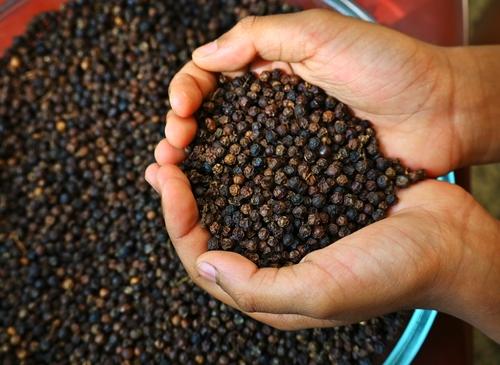Sustainable spices: the story of single-origin spices that do good and taste even better
- Like
- Digg
- Del
- Tumblr
- VKontakte
- Buffer
- Love This
- Odnoklassniki
- Meneame
- Blogger
- Amazon
- Yahoo Mail
- Gmail
- AOL
- Newsvine
- HackerNews
- Evernote
- MySpace
- Mail.ru
- Viadeo
- Line
- Comments
- Yummly
- SMS
- Viber
- Telegram
- Subscribe
- Skype
- Facebook Messenger
- Kakao
- LiveJournal
- Yammer
- Edgar
- Fintel
- Mix
- Instapaper
- Copy Link
Posted: 31 March 2025 | Ruth Davison | No comments yet
Ruth Davison, Chief Storyteller at OurCarbon, highlights how Ujaama Spice is transforming the spice industry by promoting sustainable spice sourcing from smallholder farmers in Zanzibar. By bypassing traditional supply chains, they offer high-quality, fairtrade spices that benefit both people and the planet.


By working directly with smallholder farmers, Ujaama Spice ensures fair wages and promotes eco-friendly farming practices, creating a positive impact on both people and the planet. Image credit: Shutterstock
Consumers may know their buying power, but ethical intentions are not always easy to direct. Ruth Davison, Chief Storyteller at Our Carbon, reveals how one company is bypassing the lengthy spice supply chain and reaping benefits all round.
Too often, in sustainability, we are presented with false choices. Should we focus on people or the planet when sourcing ethical products? And does making an ethical choice mean compromising on quality?
Ujaama Spice is a social enterprise on a mission to debunk myths and misconceptions around sustainability. It demonstrates that what is best for people is also best for the planet – and it tastes incredible.
“Our work is all about changing perceptions,” explains founder and social entrepreneur, Jawahir Al-Mauly. “We are here to get the world thinking about – and enjoying – fairtrade and equitable spices.”
What is best for people is also best for the planet – and it tastes incredible.
While many consumers now question the impact of their chocolate, coffee, or bananas on the planet and grower communities, this curiosity is rarely extended to nutmeg, black pepper, or cinnamon.
So why focus on spices?
Al-Mauly grew up in Scotland but has Zanzibari heritage. When she searched her local supermarket in Edinburgh for ingredients, she was shocked by the lack of information on the packaging. Where did these spices come from? When were they harvested? The packaging wasn’t even clear about what was inside. And when she brought them home to cook, the taste bore no resemblance to the vibrant flavours she remembered from childhood.
“It made me wonder what had gone wrong in the supply chain,” Al-Mauly explains. “I quickly realised it was completely broken. It is so complex and long that the two parties who really matter – the farmer and the consumer – both get forgotten. The farmer is paid a tiny wage for high-quality products, and the consumer has no idea what they’re actually buying and eating.”
With a background in African studies and international development, Al-Mauly saw a clear opportunity to do better for both farmers and consumers. She aimed to deliver the highest quality Zanzibari spices directly to UK consumers. And so, Ujaama Spice was born. Though still a young business, it is already having a profound impact.
Social impact
Firstly, and critically, farmers supplying Ujaama Spice earn at least five times the amount they would typically receive at auction. At auction, mainstream buyers create competition to drive down prices. Since all the spices sourced by Ujaama Spice come directly from small villages and subsistence farmers in Zanzibar, this increase in income is transformational for them and their families.
“Our entire business model is designed not only to generate profits but to do so in a way that creates sustainable livelihoods for farmers,” Al-Mauly says. “This is our double bottom line – financial returns and social good.”
By purchasing directly, Ujaama Spice disrupts and bypasses traditional supply chains that have kept farmers in poverty.
Historically, the ‘spice island’ of Zanzibar had one of the world’s most thriving trading ports due to global demand for its high-quality products. However, after the revolution in 1964, the Zanzibari economy fell into decline, leaving smallholder farmers struggling to export their products and maintain their livelihoods.
The spice industry we know today was developed during colonial times. Many inequalities and stigmas from this period still exist. The supply chain is full of middlemen, each taking a cut of the profit. The multiple steps – from auctioneer, to trader, distributor, processor, exporter, and warehouser – mean it takes about two years for spices to travel from the farmer to a supermarket shelf.
“Not only is this traditional supply chain ineffective and lacking transparency, but it is also based on exploitation and control,” reflects Al-Mauly.
Environmental impact
As well as benefiting farmers, Ujaama Spice’s approach has real environmental impact. The company buys entire harvests from the farmers they work with. Knowing they can sell their whole harvest for a fair price means farmers can avoid monocultures, which are harmful to biodiversity. Instead, they grow a variety of crops, benefiting the land and adapting to changing market conditions and unpredictable weather patterns, which enhances their economic resilience.
Critically, this enables farmers to maintain traditional farming methods, conserving both biodiversity and cultural heritage.
By buying directly from farmers, we bypass the broken supply chain and ensure fair wages for those who matter most.
“You won’t find any large-scale, orderly rows of monoculture spice plants on these farms,” Al-Mauly says. “These spices grow between the banana and jackfruit trees, which the farmers use to feed themselves and their families.”
This crop diversity is essential for environmental and economic resilience. Ujaama Spice’s commitment to cultivating a wide variety of crops helps farmers enhance soil fertility, reduce vulnerability to pests and diseases, and contribute to long-term environmental sustainability.
To ensure their farmers get recognition for the environmental benefits of their traditional methods, Ujaama Spice is reinvesting profits into training courses and certification for their suppliers.
Disrupting traditional supply chains also brings other environmental benefits. By avoiding lengthy transportation routes, the company significantly reduces its spices’ carbon footprint.
Consumer impact – improved quality product
Last but definitely not least, consumers get high-quality, single-origin spices.
“People can really taste the difference!” Al-Mauly says. “The variety of plants on the farms where our spices grow contributes to richer, more complex flavour notes. People can experience the true essence of the spices as they were meant to be enjoyed.”
Whether it’s black pepper from Kidichi Cooperative, nutmeg from Mitakawani Village, or turmeric from Kibeni Women’s Cooperative, Ujaama Spice’s fresh products are flavoursome, fragrant, and delicious. Consumers can trace the source of their ingredients all the way back to the farm.
Unsurprisingly, Ujaama Spice is growing rapidly in response to demand. Al-Mauly has sustainability and equity in mind as she scales.
“We will expand by working with more farmers, expanding from Zanzibar into Tanzania. We are confident we can secure a diverse and substantial supply chain without asking any farmer to overwork their land.”
By moving to scale, Ujaama Spice can roll out its training and accreditation programme, as well as tackle some environmental sustainability aspects that have proven difficult as a startup.
Al-Mauly has already identified a local, family-owned shipping company that can transport her spices from Zanzibar to the UK by sea, eliminating the need for damaging airfreight (and costly carbon offsetting). Longer-term, she is considering moving manufacturing and packaging from the UK to Tanzania, creating more local jobs.
“There’s an old proverb,” Al-Mauly recalls, “that ‘when you play the flute in Zanzibar, all of Africa dances.’ That’s the ultimate goal – to help farmers pick up that flute once again, and hope the dancing continues for Zanzibar and for all those in kitchens across the UK who enjoy the extra oomph our products bring to all those dishes they make!”
Meet the author


Ruth Davison, Chief Storyteller at Our Carbon, was auditing the supply chain emissions of Rucola, a sustainable restaurant in Covent Garden.
Our Carbon supports businesses in achieving product-level granularity in their carbon audits. The company helps businesses make decisions that are better for both the planet and their operations, while also sourcing stories that inspire.
Related topics
Ingredients, Natural, Supply chain, Sustainability, Trade & Economy









